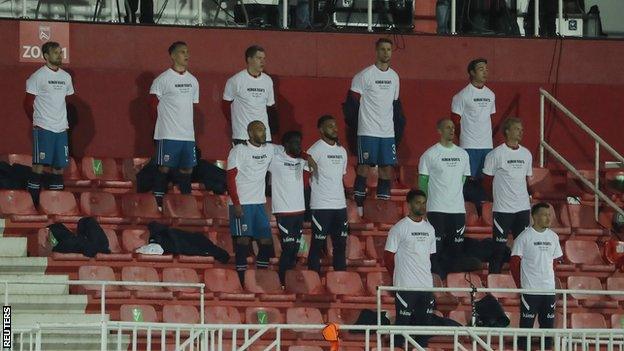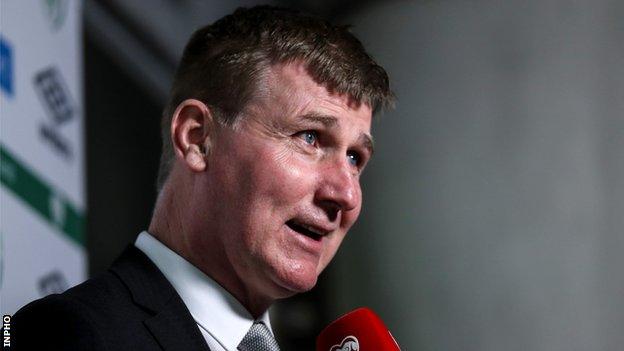Qatar v Republic of Ireland: Stephen Kenny does not know whether players will stage human rights protest
- Published

Norway's starting XI and substitutes wore T-shirts with 'Human rights on and off the pitch' just before kick-off against Gibraltar last week
International friendly: Qatar v Republic of Ireland |
|---|
Venue: Nagyerdei Stadium, Hungary Date: Tuesday, 30 March Kick-off: 19:45 BST |
Coverage: Live text commentary and match report on the BBC Sport website |
Stephen Kenny says he doesn't know whether his Republic of Ireland squad will stage a human rights protest at Tuesday's friendly game against Qatar.
A number of national sides have attempted to raise awareness of migrant workers' deaths in Qatar, which will host next year's World Cup finals.
"I haven't discussed it with them," said Kenny, when asked about the possibility of his players protesting.
"I'll leave that to themselves. Whatever they want to do."
Kenny added he is not planning to be involved in any protest at the friendly, which is taking place in the Hungarian city of Debrecen.
'6,500 deaths since 2010' - report
A report in the Guardian last month, external said 6,500 migrant workers have died in Qatar since the World Cup was awarded in 2010.
Qatar 2022 dispute these figures but have not commented publicly on them, while the Qatar government said in a statement: "The mortality rate among these communities is within the expected range for the size and demographics of the population. However, every lost life is a tragedy, and no effort is spared in trying to prevent every death in our country."
The country controversially beat rival bids from the United States, Australia, South Korea and Japan to host the tournament, with hundreds of thousands of construction workers arriving from overseas.
Last week, Norway's players wore T-shirts bearing the message 'Human rights on and off the pitch' before their 2022 World Cup qualifier against Gibraltar, and the Dutch and German national teams have also staged protests.
Kenny said that there is a "clear human rights issue in the building of stadiums in Qatar and the number of people that have died".
"That can't be ignored," he added. "Initially the Norwegian team and various other teams have backed that.
"They are entitled to do that with good reason. It's not acceptable for so many people to lose their lives.
"Any individual has the right to express their opinion on the majority of issues. I've no problem with that."

Kenny believes it's difficult to gauge the effectiveness of sporting protesting or indeed boycotts
Kenny added, however, that it was "difficult to gauge" the effectiveness of sporting protests and indeed boycotts.
"For example, American boycotting the Olympics (in 1980) and Russia boycotting the (1984) Olympics. What does that achieve?
"Even years later, we haven't really gauged a measurement of what that actually achieved.
"So is the handing out of the World Cup initially (to Qatar), is that the problem or should teams refuse to go and players refuse to play?
"It's a broader picture then in sport. So it is a very, very complex issue and something that needs a wider debate."